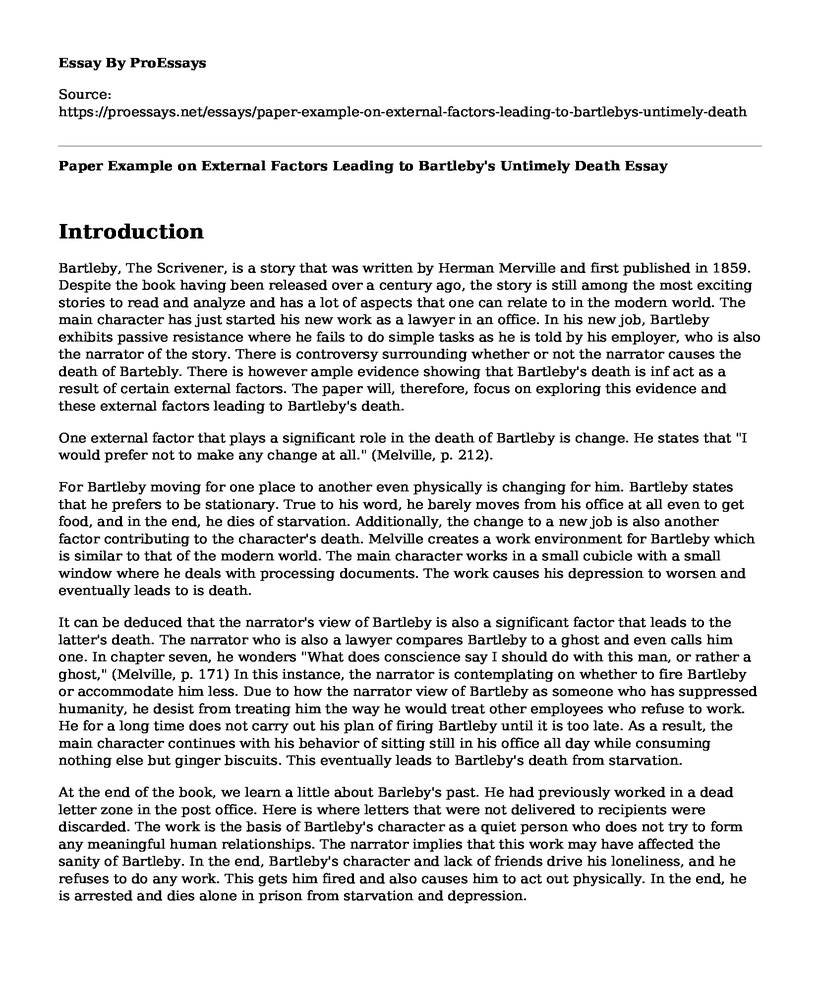Introduction
Bartleby, The Scrivener, is a story that was written by Herman Merville and first published in 1859. Despite the book having been released over a century ago, the story is still among the most exciting stories to read and analyze and has a lot of aspects that one can relate to in the modern world. The main character has just started his new work as a lawyer in an office. In his new job, Bartleby exhibits passive resistance where he fails to do simple tasks as he is told by his employer, who is also the narrator of the story. There is controversy surrounding whether or not the narrator causes the death of Bartebly. There is however ample evidence showing that Bartleby's death is inf act as a result of certain external factors. The paper will, therefore, focus on exploring this evidence and these external factors leading to Bartleby's death.
One external factor that plays a significant role in the death of Bartleby is change. He states that "I would prefer not to make any change at all." (Melville, p. 212).
For Bartleby moving for one place to another even physically is changing for him. Bartleby states that he prefers to be stationary. True to his word, he barely moves from his office at all even to get food, and in the end, he dies of starvation. Additionally, the change to a new job is also another factor contributing to the character's death. Melville creates a work environment for Bartleby which is similar to that of the modern world. The main character works in a small cubicle with a small window where he deals with processing documents. The work causes his depression to worsen and eventually leads to is death.
It can be deduced that the narrator's view of Bartleby is also a significant factor that leads to the latter's death. The narrator who is also a lawyer compares Bartleby to a ghost and even calls him one. In chapter seven, he wonders "What does conscience say I should do with this man, or rather a ghost," (Melville, p. 171) In this instance, the narrator is contemplating on whether to fire Bartleby or accommodate him less. Due to how the narrator view of Bartleby as someone who has suppressed humanity, he desist from treating him the way he would treat other employees who refuse to work. He for a long time does not carry out his plan of firing Bartleby until it is too late. As a result, the main character continues with his behavior of sitting still in his office all day while consuming nothing else but ginger biscuits. This eventually leads to Bartleby's death from starvation.
At the end of the book, we learn a little about Barleby's past. He had previously worked in a dead letter zone in the post office. Here is where letters that were not delivered to recipients were discarded. The work is the basis of Bartleby's character as a quiet person who does not try to form any meaningful human relationships. The narrator implies that this work may have affected the sanity of Bartleby. In the end, Bartleby's character and lack of friends drive his loneliness, and he refuses to do any work. This gets him fired and also causes him to act out physically. In the end, he is arrested and dies alone in prison from starvation and depression.
Work Cited
Melville, Herman. Bartleby, the Scrivener. Bartleby Library, 1999.
Cite this page
Paper Example on External Factors Leading to Bartleby's Untimely Death. (2022, Aug 17). Retrieved from https://proessays.net/essays/paper-example-on-external-factors-leading-to-bartlebys-untimely-death
If you are the original author of this essay and no longer wish to have it published on the ProEssays website, please click below to request its removal:
- "The Colonel" by Carolyn Forche Essay Example
- Essay Example on Congestive Heart Failure: Causes & Effects of Heart Malfunction
- 1984: Government Control, Rebellion, and Human Nature - Book Analysis Essay
- Poetry Analysis Essay on We Real Cool: Exploring Gwendolyn Brooks' Poem from 1959
- Essay Sample on Chun-Hyang: Kisaengs of Goryeo - A Tale of a Female Character
- Essay Example on The Hybridity of Mary Jemison & Mary Rowlandson: A Cultural Uneasiness
- Book Review Sample on Rappaccini's Daughter: Complete Spectrum of Human Morality







